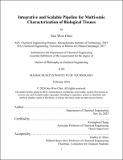| dc.description.abstract | Study of mammalian organs is essential to understand functions and dysfunctions at the state of health and disease. Specifically, comprehensive characterization of the mammalian brain is crucial to understand brain physiology and neurological diseases. Depending on the goal of the study, various brain models, such as those involving mice, postmortem humans, and three-dimensional (3D) organoids derived from human induced pluripotent stem cells (hiPSCs), can be utilized. Regardless of the models used, a large-scale, unbiased study of the brain is yet to be achieved due to the vast complexity and high interconnectedness of the cells in the brain.
For the unbiased and holistic approaches toward the elucidation of brain structures and molecular profiles, we need to achieve effective retention of biomolecular information throughout the entire volume of tissue. The elucidation of the connections, molecular profiles, and structures within these models is performed with the help of highly specific molecular probes. Revealing the identities of thousands of molecules with intact spatial context, however, is challenging as repeated exposure to molecular probe attachment conditions damages the biomolecular integrity.
To address this challenge, we developed a method to rapidly and effectively preserve biomolecular information inside the large-scale biological tissues for holistic and three-dimensional characterization. This technology, termed EPIC-SHIELD, takes a novel approach for formaldehyde fixation to achieve rapid, homogenous preservation of biomolecules across the tissue volume, which is then complemented with a carefully adjusted polyepoxy crosslinking (SHIELD) that forms stable tissue-gel hybrid for long-term stabilization of biomolecules with minimal chemical damage. To improve the scalability of informational acquisition and processing, we developed a pipeline that involves light-sheet microscopy and nuclei-based co-registration. We achieved multi-omic and multiplexed characterization of thick mouse brain tissues using our pipeline that enabled cell type analysis and ontogeny studies. Furthermore, effective preservation by EPIC-SHIELD allowed successful characterization of fresh frozen human brain samples that provided invaluable opportunity to study postmortem tissues at health and disease. As a demonstration, we compared the molecular compositions and spatial distributions of various cell types and pathological traits in control and Alzheimer’s disease samples. Lastly, we applied our EPIC-SHIELD technology for unbiased characterization of hiPSC-derived cerebral organoids co-cultured with microglia. Using our technologies, we envision that we can be a step closer to fully understand the mechanisms behind the brain physiology. | |
